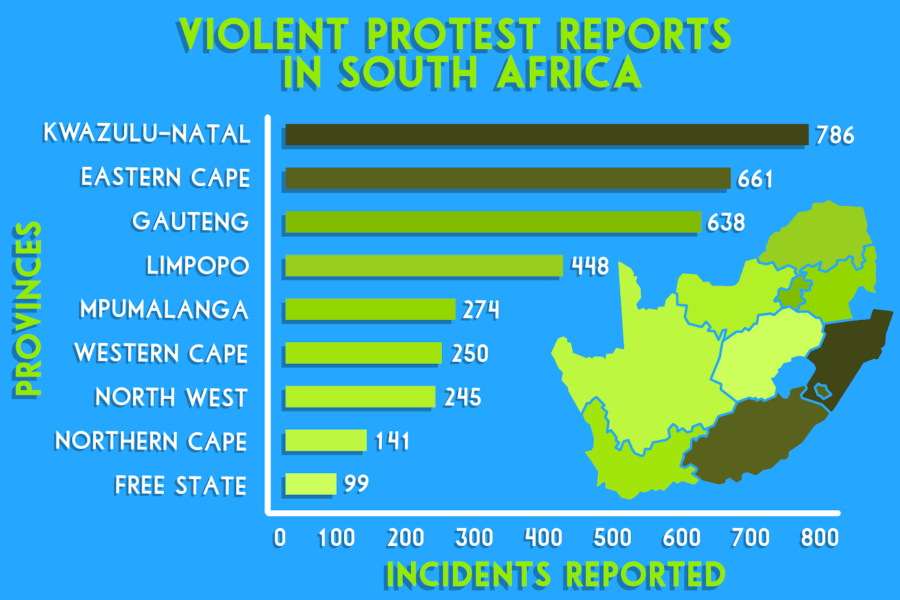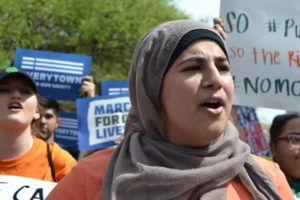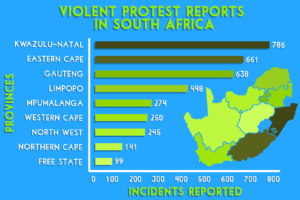Con: Violence creates protests, protests create violence
Amongst the provinces of South Africa, KwaZulu-Natal is recorded with the highest number of violent protests while the Free State has the lowest number. Public protests have grown more violent over the past five years, causing police to look past other serious crimes.
October 10, 2018
In theory, protesting or demonstration is a good idea. It is protected by the Constitution and can incite change, but reality is different from theory. In reality, protesting is not a good idea to further a cause.
It is nearly impossible to control a protest because of the sheer amount of people with free wills of their own. Demonstrations are getting passionate people together in a crowd which can cause mob mentality and outrage.
There is the chance the protest can become violent. This makes the cause seem like it is a hate group and nobody enjoys supporting those. On the slight chance the protest works, it will most likely go unnoticed. Many media companies feed off anything interesting and people walking successfully is not newsworthy. Several things can go wrong and several things have gone wrong which hurt the causes of both the right-wing and left-wing side in American politics.
The first example came when an alt-right protest was met with a counter protest by Antifa. It is unclear which side started the fight but an Antifa member who was a victim of the protest says the attack was unprovoked from the alt-right side.
The victim, Louise Rosealma, spoke out about what happened to her at the protest and the violence she had suffered. This caused Antifa to gain support because of how they were attacked.
With both these groups being unpopular, it is surprising to see how whenever something turns violent it has the opposite of the intended effect. Likewise, if the protest had gone the other way, the alt-right would have gained support, which, like Antifa, is also a hate group.
The second example deals with the left movement when a cop was let off for shooting an unarmed black man. The issue was that the officer had shot someone he thought was reaching for a gun. The gun was found but only the officer’s DNA was found. This caused theories of the gun being planted.
Black Lives Matter had gathered outside the courthouse and marched downtown to the mayor’s house. The mob began to throw rocks at the residential building. The group was able to block the highway and injure four cops, one who was hospitalized with a hand injury. The protesters attacked the cops with water bottles and broke a squad car’s windows.
After this event, Black Lives Matter lost a lot of support from both sides because of how it attacked the mayor even though he had nothing to do with the trial. Some do not agree with Black Lives Matter’s methods.
With these groups, the public’s opinion is so decisive that every time something violent happens with the groups name attached, the group is seen more and more as a hate group or the enemy. When you can not control a group of people it is not a smart idea to get them to speak about something they are extremely passionate about.
With protesting being such a popular method of expressing the group’s opinion, the public’s view of groups is constantly shifting, causing a general sense of distrust. This causes people unsure of what cause to follow because it seems like everyone is evil today. Protesting hurts the cause if it turns violent, but what if it does not go wrong?
According to Crowd Counting Consortium, which tracks every protest, more than 8,700 protests happened in the United States last year. How many were remembered? What change did these cause? Also according to the CCC, 74 percent were against President Trump. Yet Trump is still president. Around 8,010,000 people spoke against Trump and he was still elected.
But for example, on Aug. 14, Antifa attacked a peaceful free speech rally in Boston. The protest was peaceful and there was only a few dozen alt-right. Antifa began to harass the press. This caused them to be vilified on the news for being a hate group. This caused Antifa to lose 300 Twitter followers.
These examples show that protesting will most likely make people hate the group more or go unnoticed. There are other ways to spread an opinion than marching through a city destroying property. Other more peaceful methods could include registering to vote or calling your local representatives.
People don’t realize how important voting is. During the 2016 Presidential Election, 58 percent of registered voters voted. While this is more than other elections have had, it is still a little more than half the registered voters. If everyone was to share their opinion and vote then we could have more fair elections. Do not slack and then be upset about the consequences. Emailing your representatives is a better method because it is more direct and personal than a protest.











